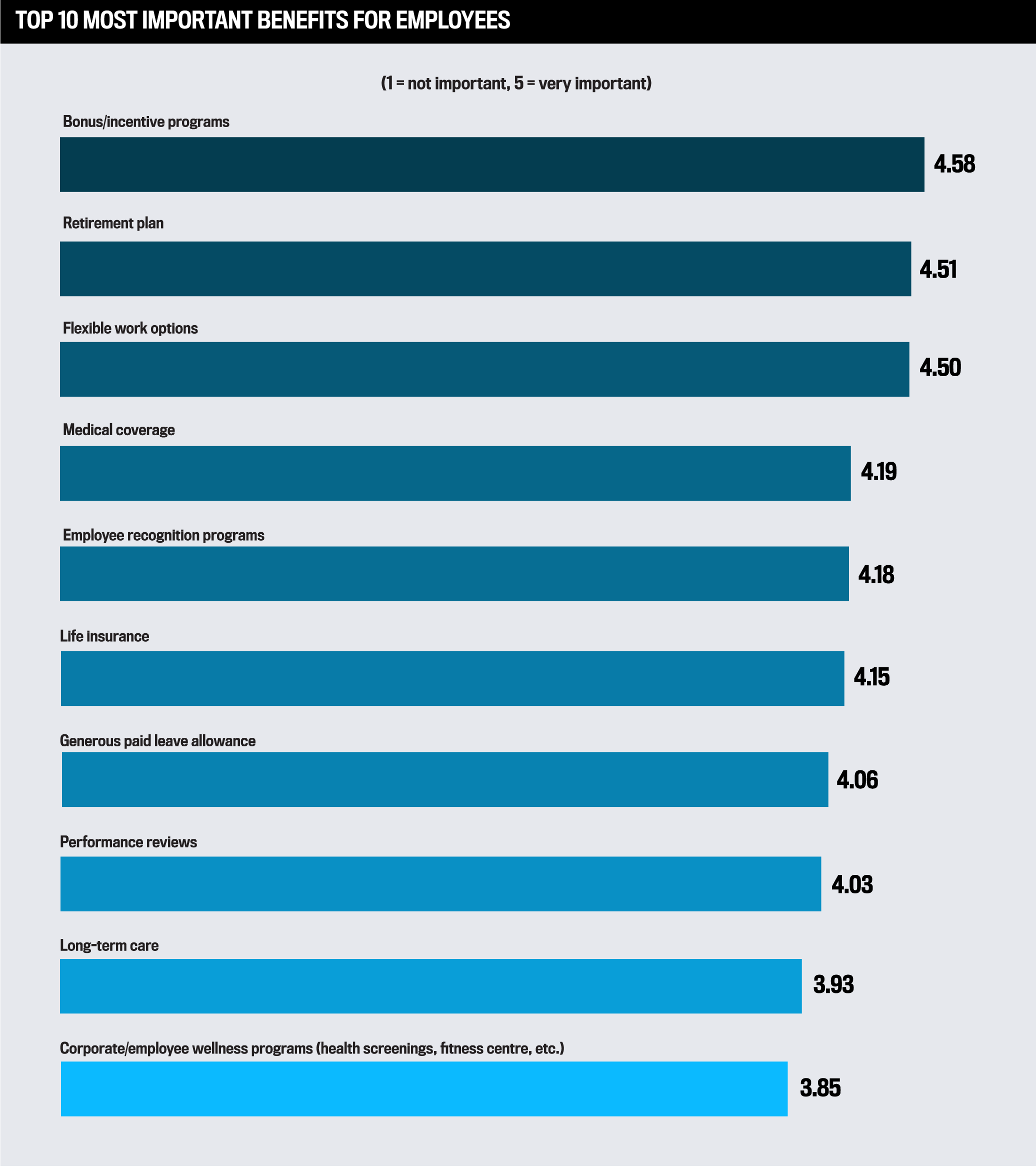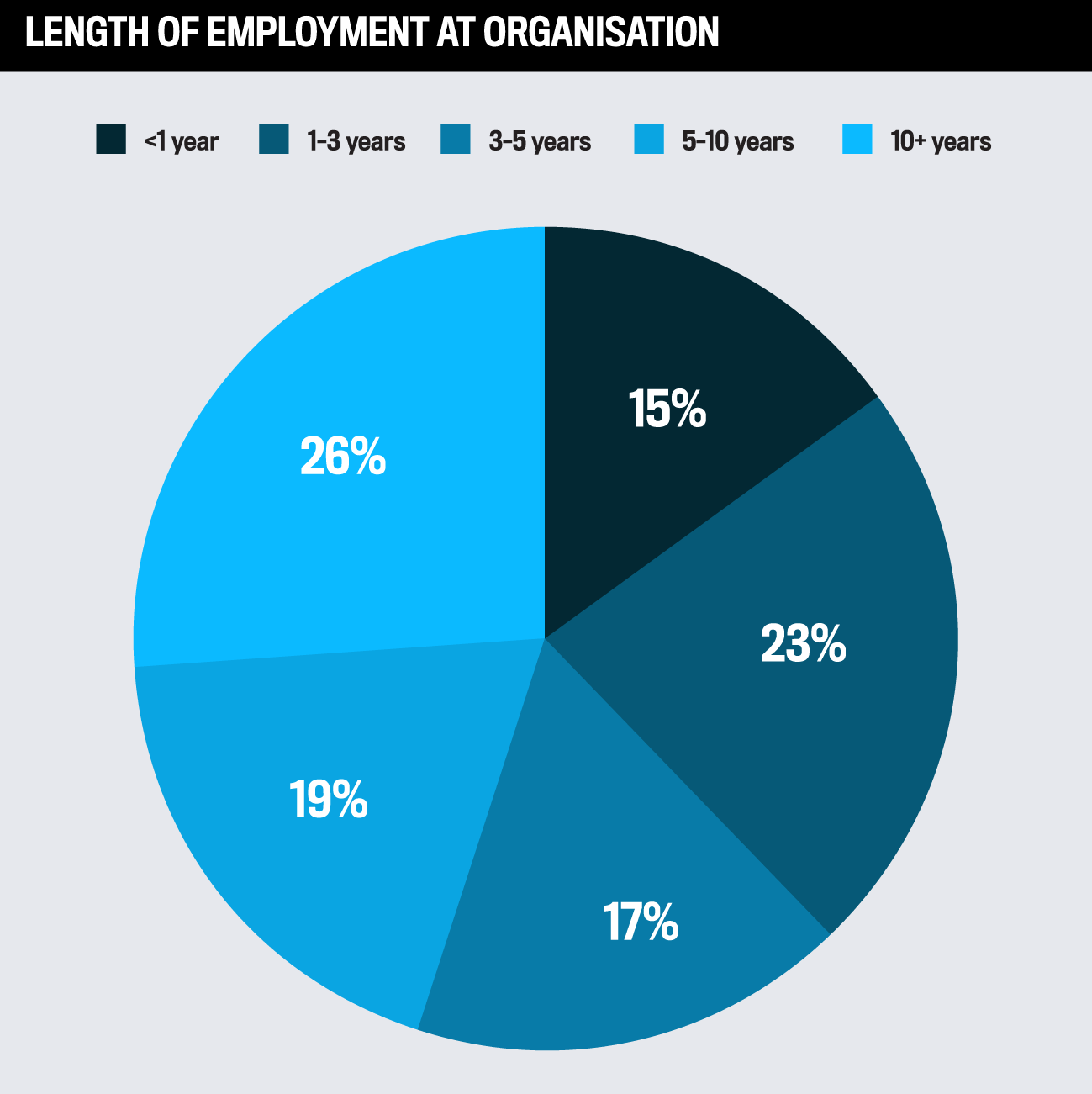Jump to winners | Jump to methodology
Holding all the cards
It’s never been harder to excel as an employer in the insurance sector.
“This is the most challenging market I have worked in going on 17 years,” says Kieran Boyle, the managing director of CKB Recruitment. “Employers are having to up their game, which is resulting in the employee holding all the cards.”
This is echoed by Nishma Gosrani OBE, partner in the financial services practice at Bain & Co. in London, who explains how important it is to deliver in the current climate. “If you’re spouting something different in your recruitment material to what you actually are, it becomes very obvious.”
“This is the most challenging market I have worked in going on 17 years. Employers are having to up their game, which is resulting in the employee holding all the cards”
Kieran Boyle, CKB Recruitment
For Boyle, there are two types of employers. First, companies who have learned from the pandemic to accept flexible working arrangements and to reinvest in their staff. Second, businesses who have resisted change.
“Firms who have not evolved post pandemic are the biggest losers in the talent attraction war,” explains Boyle. “There are stubborn CEOs who for some reason think selling insurance cannot be done – at least sometimes – remotely.”
Positioned squarely in the first category are 2023’s IBUK Top Insurance Employers, 14 award winners whose own employees ranked them highly in areas such as benefits, compensation, culture, employee development, and diversity and inclusion.
Issues in the insurance labour market
For Jo Morgan, associate director of HR at Top Insurance Employer TH March, the main factors influencing the insurance labour market are work-life balance and ensuring proper renumeration.
TH March has had a hybrid policy for a few years and continually monitors it via Pulse surveys.
“We are finding that hybrid working is a top priority for candidates and is often asked even before salary discussions during the recruitment process,” says Morgan.
For the 125 employees across their six branches in the UK, TH March has more than 60 varied working arrangements and 25% of staff who work part-time. Regarding employee wellbeing, 11% of TH March’s employees are trained as Mental Health First Aiders.
This exemplifies the analysis provided by Gosrani, who picks out the most important factor for employers. “The culture of the organization and the culture of senior management, because there is so much more access from graduates on how they can understand their culture,” Gosrani adds how recruitment websites and people keeping in touch with former colleagues means there is an abundance of information for employees to access.
Jenny Cooper, the head of HR at award-winner Flood Re, also asserts that her firm has adapted its ways of working in this environment. “We need to balance business needs with employee expectations and find a way to get this right within hybrid working,” she says.
Meanwhile, there’s the money issue. “One of the main issues I see influencing the employment market within the insurance industry in 2023 are the drastic cost of living increases,” says Morgan. “Salaries need to remain competitive to ensure that we attract, recruit and retain the best employees.”
Cooper adds that it’s important to find and keep the right people in this highly competitive and fast-paced recruitment market. Marcella McLean, the chief human resources officer at Top Insurance Employer Arch International, agrees.
Then there’s diversity, equity, and inclusion (DE&I), which both Cooper and McLean say remains important. “Keeping sight of and a focus on DEI and finding ways to be truly inclusive as inclusion means something different to everyone,” says Cooper.
Again this is something Gosrani stresses is a major factor and says when she speaks to CEOs it “almost always comes up.”
And she adds an example of how important it is across the industry. “We actually worked very closely with a number of insurance organisations, including the chief executive of Aviva, very recently on the Women in Finance Charter blueprint, which has been rolled a large number of Financial Services Organisation.”
What matters to employees
For the IBUK Top Insurance Employers survey, employees ranked the top 10 most important benefits, shown in the box below.

“We are finding that hybrid working is a top priority for candidates and is often asked even before salary discussions during the recruitment process”
Jo Morgan, TH March
Regarding the top priority for employees being bonus/incentive programs, McLean explains there has been a shift back to basics. “Whereas in recent years, there had been a greater focus on providing a more holistic range of employee benefits, the current financial climate is undoubtedly seeing a shift in perceived importance to the more financially oriented aspects of the benefit programme,” she says.
In the survey, one of her colleagues at Arch says, “We can always say ‘pay more’ especially in the current economic environment.”
Cooper says retirement plans are something that everyone eventually prioritises. “We ensure our employees have access to comprehensive financial advice and support to maximise all of the benefits available to them,” she says. “We want to make retirement planning as easy as possible and positively encourage people to plan and save for their futures.”
Flexible work options have become integral as a result of the pandemic. However, McLean warns, “It is imperative that we ensure that the integration of flexible working does not hinder the development of the individual employee. In the case of the insurance industry, face-to-face interaction with colleagues and market peers as well as on-site mentoring and training are core parts of the development process.”
As part of the survey, an anonymous Arch employee states, “The work environment is really healthy, and management is friendly, open minded and always available.”
For Cooper, medical coverage through their current private medical insurance provider is paramount. “It’s reassuring to know employees can get quick and easy access to the support and treatment needed when needed without having to jump through unnecessary hoops,” she says.
Lastly, there are employee recognition programs. “It is vital that the hard work and dedication of employees across every level of an organisation are recognised,” says McLean. “Such recognition and reward provide an excellent mechanism for not just motivating employees but also reinforcing a positive company culture.”
Another anonymous Arch employee states that the company values its employees. “I feel as if I’m taken seriously and highly valued within Arch, and this is the first company I have worked for where I’d be happy to stay until I retire.”
“We need to continue to nurture and take care of our culture – in my opinion, culture needs constant attention, it’s not about periodic culture exercises”
Jenny Cooper, Flood Re
What could be done better?
Progress is a constant process and not a destination.
Gosrani explains how standout firms gather data from their employees and act on it, which is something being practiced by IBUK’s Top Employers. She says, “So, they are listening on a frequent basis. If you look at some of the CEO changes across the insurance industry, we’re seeing a fundamental shift in type of personality and we’re seeing a lot more women in those senior roles than we’ve ever seen before, but also the old group of male CEOs that used to almost run that part of the industry have now moved on NED roles etc.”
The box below shows IBUK’s survey results about what employees feel on a range of issues.

The key to remaining a Top Employer is to appreciate what these types of changes mean. “You’re getting new blood who want to do things differently, and they recognise that the voice of the employee is extremely important,” adds Gosrani.
These initiatives are in action at Arch. McLean says due to the diversity of the workforce it’s difficult to generalise, so they combat this with a thorough approach.
“We have established employee forums and multiple methods and process for capturing feedback and measuring employee satisfaction, from group-level surveys to individual sessions,” she says. “This feedback helps us to understand what staff want and implement suggestions that are beneficial to creating a positive and productive working environment. Our aim at Arch is to continue to build on the success of our programmes and platforms to ensure that we are constantly listening and responding to the needs of our employees.”
On the survey, anonymous participants were largely happy with the work environment at Arch. Some expressed a desire for slightly better transportation options, more career development, better IT, maternity, and DE&I programs.
Meanwhile, Cooper prefers to think of what they can do to make working at Flood Re better.
“It’s important to stay focused and committed to our DE&I journey and clearly set out our ambitions,” she says. “We need to continue to nurture and take care of our culture – in my opinion, culture needs constant attention, it’s not about periodic culture exercises. And then we must continue to seek employee feedback so we really understand what it’s like working at Flood Re and use this to direct our efforts.”
“It is imperative that we ensure that the integration of flexible working does not hinder the development of the individual employee”
Marcella McLean, Arch International

501+ employees
- Crawford & Company
- RSA Insurance
- Specialist Risk Group
101–500 employees
- Policy Expert
- QuestGates
- Quotemetoday.co.uk
26–100 employees
- Momentum Broker Solutions
- The Plan Group
10–25 employees
- All Medical Professionals t/as All Med Pro & Grow Insurance Partners
- Sutcliffe & Co. Insurance Brokers
To find and recognise the best employers in the insurance industry, IBUK first invited organisations to participate by filling out an employer form, which asked companies to explain their various offerings and practices. Next, employees from nominated companies were asked to fill out an anonymous form evaluating their workplace on a number of metrics, including benefits, compensation, culture, employee development, and commitment to diversity and inclusion.
To be considered, each organisation had to reach a minimum number of employee responses based on overall size. Organisations that achieved a 75% or greater average satisfaction rating from employees were named Top Insurance Employers for 2023.




